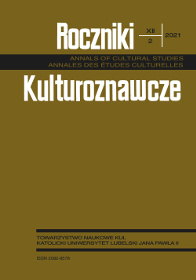Cracks in Education: Alternative Schooling in Cultic Groups
Abstrakt
Edukacyjne pęknięcie: o kształceniu alternatywnym w grupach kultowych
Cechujący sektę rozbrat z wartościami ogólnospołecznymi, wyrażający się w ograniczaniu kontaktów jej członków z osobami spoza własnego środowiska, przejawia się w jej krytycznym stosunku do powszechnego systemu szkolnego, a w związku z tym – w powoływaniu własnych szkół, gdzie obowiązuje formuła kształcenia odmienna od spotykanej w tradycyjnych instytucjach oświatowych. Niektóre ugrupowania wykorzystują też zapisy prawne umożliwiające realizowanie nauczania domowego, co pozwala im uchronić dzieci przed – szkodliwym w ich mniemaniu – wpływem środowiska zewnętrznego. Wszystko to prowadzi do swoistego pęknięcia w relacjach sekty z systemem oświaty, będąc przyczyną utraty przez nią tak zewnętrznych, jak i wewnętrznych mechanizmów kontroli służących ograniczaniu potencjalnych nadużyć, przez co dzieci ze środowisk kultowych stają się bardziej bezbronne aniżeli rówieśnicy wzrastający w społeczeństwie wyposażonym we wspomniane mechanizmy, nawet jeśli są one czasem implementowane w sposób niezadowalający. Uczniowie odbywający naukę w ramach powszechnego systemu szkolnego utrzymują regularny kontakt z rówieśnikami pochodzącymi z różnych rodzin i grup społecznych. Podobnie w odmiennych kontekstach społecznych osadzeni są nauczyciele i pozostali pracownicy oświaty, co daje im pespektywę umożliwiającą dostrzeżenie potencjalnego problemu i pospieszenie dziecku z pomocą.
Bibliografia
Act of 7 September 1991 on the Education System. Dz.U. [Polish Journal of Laws] of 1991, No. 95, item 425 as amended.
Beckford, James A. Cult Controversies: The Social Response to the New Religious Movements. London: Tavistock Publications, 1986.
Coney, Judith. Sahaja Yoga: Socializing Processes in a South Asian New Religious Movement. Richmond: Curzon Press, 1999.
Constitution of the Republic of Poland of 2 April 1997. Dz.U. [Polish Journal of Laws] of 1997, No. 78, item 483 as amended.
El Mountacir, Hayat. Les enfants des sectes. Paris: Fayard, 1994.
Gajewski, Mariusz. “Młodzież a współczesne kontrowersyjne sekty: wybrane zagadnienia.” Homo et Societas: wokół pracy socjalnej, no. 3 (2018): 36–47.
“Going Home? Go Mobile!” exFamily.org, 1998. DO 2507, 3/89.
Hassan, Steven. Combating Cult Mind Control. Newton: Freedom of Mind Press, 2018.
Heimlich, Janet. Breaking Their Will: Shedding Light on Religious Child Maltreatment. Amherst: Prometheus Books, 2011.
International Covenant on Economic, Social and Cultural Rights. Adopted and opened for signature, ratification and accession by General Assembly resolution 2200A (XXI) of 16 December 1966 entry into force 3 January 1976, in accordance with article 27.
Introvigne, Massimo, Alessandro Amicarelli, Willy Fautré, Bernadette Rigal-Cellard, and Frédéric-Jérôme Pansier. “Separatism,” Religion, and “Cults”: Religious Liberty Issues. White paper published online by Centre for Studies on New Religions, 2020. Accessed January 18, 2021. https://www.cesnur.org/2020/separatism-religion-and-cults.htm.
Jędryszka, Dariusz. “Z Nieba do szkoły.” Dziennik Wschodni Lubelski, January 7, 2002. https://www.dziennikwschodni.pl/lublin/z-nieba-do-szkoly,n,1000020271.html.
Kowalczyk, Jerzy. “Nieba kres.” Polityka, July 30, 2005, pp. 32–34. https://www.polityka.pl/archiwumpolityki/1864764,1,nieba-kres.read.
Krasnowska, Violetta. “Wysłannik Boga. Sekta pod Lubartowem.” Polityka, August 8, 1993, p. 14.
Kropveld, Michael, and Marie-Andrée Pelland. The Cult Phenomenon: How Groups Function. Translated by Natasha DeCruz and Gwendolyn Schulman. [Montreal]: Info-Cult, 2006.
Lalich, Janja, and Madeleine Tobias. Take Back Your Life: Recovering from Cults and Abusive Relationships. Berkeley: Bay Tree Publishing, 2006.
Law on compulsory primary education dated 28 March 1882. Official Journal of the French Republic, 29 March 1882, no. 87, p. 1697–99.
Maria. “Our Children’s Education!” exFamily.org, (1998): Maria #343, DO 3066, 7/96.
Miller-Stefańska, Ewa. “Sekty a prawo.” In ABC o sektach, edited by Mariusz Gajewski, 71–80. Kraków: Civitas Christiana, 1999.
Nowakowski, Piotr T. “Uzasadnienie ujęcia problemu sekt na gruncie pedagogiki resocjalizacyjnej.” In Sekty jako problem współczesności, edited by Piotr T. Nowakowski, 183–92. Mysłowice: Górnośląska Wyższa Szkoła Pedagogiczna imienia Kardynała Augusta Hlonda, 2008.
Nowakowski, Piotr T. Sekty: co każdy powinien wiedzieć. Tychy: Maternus Media, 1999.
Palayon, Raymund T., Richard Watson Todd, and Sompatu Vungthong. “The Language of Destructive Cults: Keyness Analyses of Sermons.” Communication & Language at Work 7, no. 1 (2020): 42–58.
Peter. “The Family’s History, Policies, and Beliefs Regarding Sex — Part 3.” exFamily.org, (2007): ML #3673, GN 1236, 10/07.
Ptaszek, Robert T. “Filozoficzno-kulturowe uwarunkowania działalności współczesnych grup kultowych.” In Grupy kultowe: uwarunkowania społeczne, edited by Mariusz Gajewski, 409–27. Kraków: WAM, 2012.
Rewera, Mirosław. “Posłowie. Sekta Niebo i jej przywódca.” In Sebastian Keller, Pięć lat w sekcie Niebo, 115–30. Tychy: Maternus Media, 2011.
Singer, Margaret T. Cults in our midst. San Francisco: Jossey-Bass Publishers, 2003.
Siskind, Amy. “Child-Rearing Issues in Totalist Groups.” In Misunderstanding cults: searching for objectivity in a controversial field, edited by Benjamin Zablocki and Thomas Robbins, 415–51. Toronto: University of Toronto Press, 2001.
Synek, Eva M. “The Limits of Religious Tolerance – A European Perspective.” Journal for the Study of Religions and Ideologies 1, no. 3 (2002): 39–51.
U.K. Department for Children, Schools and Families. Elective Home Education: Guidelines for Local Authorities. London, 2007.
Więckiewicz, Bogdan. “Rodzice i szkoła wobec edukacji dzieci w wieku sześciu lat.” In Rodzina polska – nowe wyzwania. Wybrane aspekty, edited by Bogdan Więckiewicz, 14–50. Stalowa Wola: Wydział Zamiejscowy Nauk o Społeczeństwie KUL w Stalowej Woli, 2013.





